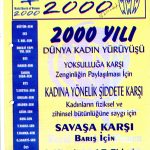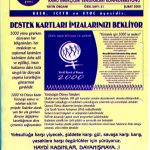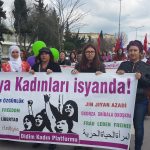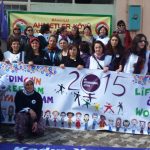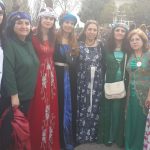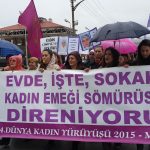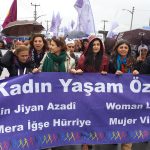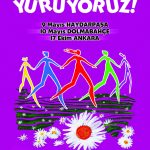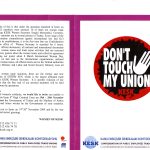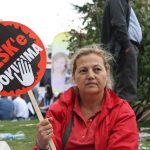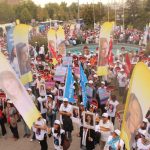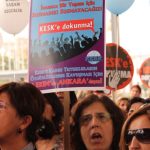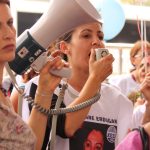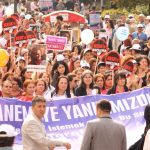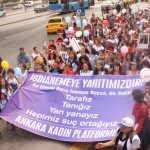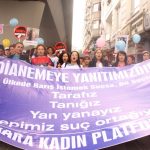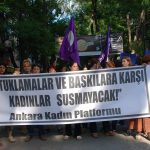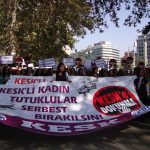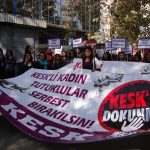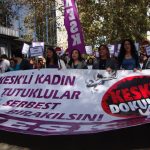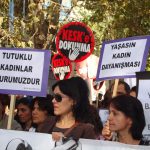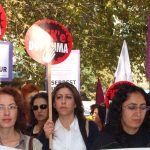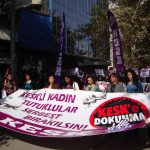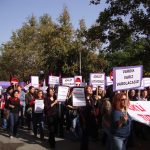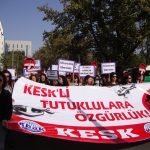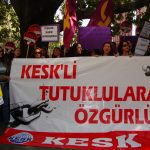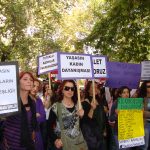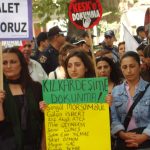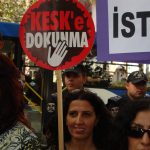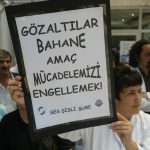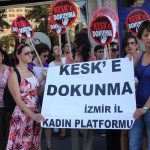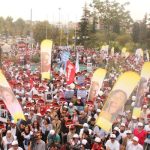SOLIDARITY AND TRANSFORMATION BY ACTION
KESK women had various priorities on their agenda when they began their journey. Socialism, workers’ rights, peace, women’s rights, a freer and more equal world.
What they had in common was that they faced similar inequalities and discriminations at home, at work, on the street as well as in the union, regardless of their group or any political group they felt close to. All of them worked harder than their male comrades in their own political groups, yet were underrepresented.
Having different views and approaches made it difficult for them to act together in environments where higher politics and abstract issues were discussed, such as the general assemblies of trade unions.
However, when they organized the March 8 or November 25 events together, the distancing effect of the different political approaches disappeared. While doing concrete work, they naturally approached each other. While they carried the preparatory work that started in the union buildings to their homes, they organized protests during the meetings where they ate raisin cookies together and entered each other’s lives and became closer in the process. As Latife Kahya tells, there were people who took part in the action with their 40-day-old baby since they had no one to care for the baby. But as Emine Akyazılı summarized with her sentence “We raised the children together”, it was also common for them to share childcare in solidarity. Although official discourses were repeated at union meetings, in women’s education groups, domestic violence was discussed, and these education groups were starting to resemble awareness raising groups.
The development of a common women’s identity at KESK, regardless of their political affiliation, has developed through such concrete practices, the shared experiences they had developed in life, and women’s solidarity. Even if a full consensus has not been achieved in union general assemblies, women are now acting jointly on the women’s policies of the union.
In the development of this attitude, working together, sharing daily life and touching each other’s lives, as mentioned above, played a decisive role. In addition, the educational activities during which they met feminist academics, the women’s platforms that enabled them to meet independent women’s organizations, and the actions and activities they organized on these platforms played an important role both in the development of the women’s perspective and in the transformation of the women involved. It was effective in establishing solidarity networks among the women at KESK, at local and global levels.
The shared experience of domestic violence as well as the vital solidarity-based relationships among women showed their effects in different contexts as well. For example, as early as 1998, the decision of KESK women from all over the country to go to Diyarbakir to celebrate March 8 with the women in Diyarbakir, and the 400 women from KESK to set out for this, pointed to a different meaning of solidarity. KESK women were under pressure wherever they were, faced with disciplinary investigations, banishments and criminal cases. Human rights violations in the OHAL-Region (regions under state of emergency), where Kurds live, also included unsolved murders. As Nebahat Akkoç and Zübeyde Caner described, one of the most important union activities in Diyarbakir was the creation of lists of members’ blood groups. The act of going to Diyarbakir on 8 March 1998 was an act of solidarity with their comrades in Diyarbakır and of opposing the human rights violations that took place there.
There were dozens of examples of transformative solidarity among them, in their relationship with women’s organizations and in the local and global actions during thirty years long period of struggle. The World Women’s Marches and the solidarity actions for imprisoned KESK women at the Women’s Platforms consisting of women from independent women’s organizations and mixed organizations are just two examples.
World Women’s March
The World Women’s March Initiative, which includes more than five thousand participating women’s groups from nearly two hundred countries and regions, has been holding global women’s marches every five years since 2000, addressing the problems women face globally such as violence, poverty, racism, discrimination, and underrepresentation. The marches, the first of which passed through Turkey on March 8, 2000, are continued with the participation of women in every country and region, with a wide variety of actions and activities. The demands of women are collected, while a patched global quilt is woven. The patchwork quilt, which grows with the patches added, is transferred from one country to another, while also serving for women to network with each other. At the end of the march, the demands of women are conveyed to the United Nations.
All the marches, especially the World Women’s March in 2000, had a tremendous transformative effect on KESK women. These marches contributed to the raising of awareness of the global dimensions of the problems faced by women such as poverty, violence, discrimination and underrepresentation, and to the process of organizing and taking action to eliminate these problems. For the women at KESK who had different political group affiliations and worldviews, the World Women March activities played an important role in creating a common language, developing a common women’s perspective and transforming together, by collaborating, organizing actions together. They were effective in the development of a common KESK woman identity.
These marches also strongly contributed to the development of a culture of solidarity and networking, including themselves as well as women in independent women’s organizations and other mixed organizations in Turkey, and the global women’s movement. On March 8, 2000, when the World Women’s March was launched, the slogan “March 8, 2000, We are marching to change the world” was written on a banner carried by women. In this attempt to change the world, KESK women changed themselves and each other.
Workshops, panels and human chains created, as Gülay Lale explained, with the aim of presenting the demands of women in Turkey, mobilized the women of KESK on the axis of women’s agendas.
The process of creating women’s demands in Turkey, as well as the activities, helped different women’s groups in Turkey to get closer to each other and to be informed about each other’s different problems. One of the first examples of the 8 March declaration being read in languages other than Turkish was the 8 March 2000 Istanbul Meeting, where the World Women’s March began. At this meeting, the March 8 statement was also read in Kurdish.
The activities of the Turkey section of the World Women’s March were not limited to the centers where the march would take place. It spread to all cities where unions affiliated to KESK were organized. Not only did KESK mobilize women. They also enabled the World Women’s March to reach women outside of KESK and the women’s movement, with activities such as opening stands, collecting signatures and making press statements in the cities they lived in.
The World Women’s March made it possible for women to interact with each other and work together at the local level, and to establish solidarity networks at the global level. Women from KESK had established international relations before, but this was mostly at a representative level. The World Women’s March was the first time that they were able to go beyond local and national borders, interact with the global women’s movement and their demands, and look at their own experiences from the outside. This had an eye-opening and confidence-boosting effect, as Emine Ayazili described. When Emine went to Thessaloniki with the group that would transfer the Global Women’s Quilt from Turkey to Greece, she met the unionist women and the women’s movement there and made a comparison about the situation of the women in KESK. She returned with more experience, feelings of solidarity and self-confidence.
The fact that the KESK Women’s Secretariat took charge of the coordination of the Turkey branch of the World Women’s March and KESK Women’s Secretary Sevgi Göyçe acted as the spokesperson for the coordination made it possible for KESK women to participate more in international processes as well as increasing their interest and excitement. Within the scope of the World Women’s March activities, there were also women from KESK in the women’s delegation, which went to the United Nations headquarters in New York with representatives from different countries, delivering the global women’s demands, and holding a march afterwards. This was very meaningful for many KESK women.
This interaction played a role not only in the establishment of global networks, but also in the development of relations of solidarity. For example, when the police attacked the KESK women marching in Düzce within the scope of the World Women’s March and injured some of them, the World Women’s March coordination issued a statement condemning the interior minister during that time.
To sum up, the World Women’s March processes included activities of women learning together by doing, of transforming themselves and each other, and of solidarity. In this context, the World Women’s March activities constitute a meaningful example for feminist pedagogy.
SOLIDARITY WITH IMPRISONED KESK WOMEN
As stated in the text titled “What is KESK?” KESK’s union understanding does not have a narrow perspective that only protects the social rights and economic interests of public workers. It deals with the struggle for the rights and interests of public workers together with the struggle for a more equal, free and fair world.
This feature also prevented KESK from being affected by the increasing wave of nationalism in the country. One of the features that makes KESK unique is that it is still organized everywhere from the east to the west, from the north to the south of the country, and that it has succeeded in creating a common language, mobilizing public employees in all these different places around common agendas, regardless of their ethnic, religious or sectarian identities. However, the fact that it was organized regardless of ethnic, sectarian and religious identities did not cause KESK to remain indifferent to the specific problems and demands arising from these identities. KESK made efforts to resolve the Kurdish problem through peaceful democratic means.
This feature made the KESK, in which Kurdish public workers were also organized, a target during the times when nationalism and especially the oppression of the Kurds increased. Since 2009, detention and arrest operations have been carried out to portray KESK as “related to terrorism” in public.
During these detention and arrest operations, Kurdish women from KESK were also detained and arrested. Kurdish women from KESK were actively involved in the gender equality work of their unions. When the operations began, they were women’s secretaries in most of the KESK and affiliated unions. Like many KESK women, they also took part in Women’s Platforms and interacted with independent women’s organizations. In working together, they were transforming each other and themselves. If the relationship between them can be named as sisterhood, it has been a sisterhood built by struggling together in action.
In 2009, firstly, SES member Seher Tümer was detained and arrested in Ankara. Then, on 28 May 2009, in an operation that spread to various cities, many trade unionists, including former and new female secretaries of KESK and its affiliated unions, were detained and arrested. On February 13, 2012, 15 KESK women were detained in an operation targeting only women. All of the detainees consisted of women who were working as women’s secretaries in KESK and affiliated unions or actively involved in women’s work. All of them were busy preparing for March 8 together with the women’s platforms. Due to their duties, they were in close relationship and cooperation with women’s platforms. Among them, 9 trade unionists were arrested and kept in prison for periods ranging from 8 to 10 months.
The fact that detentions and arrests were associated with “terrorism” did not cause any drawbacks for women’s organizations and women’s groups working with KESK women on the platforms. On the contrary, they showed tremendous solidarity with the women of KESK, despite the climate of fear created by the operations carried out in 2009 and 2012. Since the beginning of the arrests, independent women’s organizations and women academics who were members of Eğitim Sen have carried out solidarity actions with imprisoned KESK women. They sent hundreds of letters of solidarity to the prisons. The women’s platforms turned the fronts of the courts into rally areas during the hearings.
The arrest of Kurdish female trade unionists also revived and strengthened the solidarity among the women of KESK. The KESK women, who left their union due to harassment cases which, despite KESK’s experiences, was not managed well, or due to other reasons, returned to work after their female secretaries were arrested. In order for the arrests not to disrupt the work, they started to continue the work from where they left off.
The solidarity and campaigns developed by the women’s movement with KESK women and Kurdish women public workers were not limited to giving strength to the women of KESK, to the dismissal of the heavy accusations against them, and the acquittal of KESK and the women of KESK. This solidarity was also a strengthening and hopeful experience for peace and the sisterhood of peoples.

